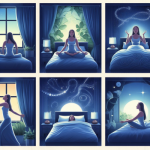Sleep is essential for optimal health and wellbeing. The quality and quantity of your sleep has a direct impact on how you feel during the day, as well as your overall health and wellbeing.
I’m here to help you take control of your sleep and make sure that you are getting the most out of it. In this article, I’ll share advanced techniques for improving your sleep quality and quantity so that you can achieve maximum health benefits.
Establishing A Regular Sleep Schedule
 It’s no secret that getting enough quality sleep is essential for optimal health and wellbeing. But how can you make sure to prioritize rest?
It’s no secret that getting enough quality sleep is essential for optimal health and wellbeing. But how can you make sure to prioritize rest?
Establishing a regular sleep schedule is key in winding down at the end of the day, so let’s dive into some advanced techniques on how to do just that.
One way to start establishing a regular sleep schedule is setting an alarm clock each night as a reminder to go to bed at the same time every evening. This will help train your body and mind when it’s time to wind down and relax before heading off to dreamland.
Additionally, avoiding stimulants such as caffeine or heavy meals close to bedtime will also help ensure that you get proper rest since these substances may interfere with relaxation which leads to difficulty falling asleep.
Finally, creating a pre-bed routine like reading or journaling can be beneficial in assisting with both relaxation and shut-eye preparation. Taking part in activities such as stretching or yoga prior to sleeping have been proven helpful in releasing tension from the muscles while calming the nervous system.
Allowing yourself ample time for this ritualistic behavior not only helps create structure but serves as a healthy habit for unwinding after a long day – all leading up to one thing: improved sleep quality and quantity!
Creating A Sleep-Friendly Environment
Creating a Sleep-Friendly Environment is essential for ensuring optimal health and wellbeing.
First, reducing noise levels in the bedroom can help promote deeper, restful sleep. Investing in heavy curtains or blackout shades to reduce external noise such as traffic or neighbors can be beneficial. Adding white noise machines and soundproofing materials like acoustic foam panels could also provide relief from intrusive noises.
Secondly, adjusting lighting within the sleeping space is another crucial step when trying to optimize sleep quality. Dimming lights a few hours before bedtime helps cue your circadian rhythm that it’s time to start winding down for the night. Installing dimmers on overhead lights and/or opting for softer lamps instead of harsh bright bulbs may greatly improve overall sleep quality.
Similarly, avoiding electronics with blue light screens prior to bedtime plays an important role in helping you fall asleep faster and stay asleep longer. Blue light emitted from phones, tablets, TVs, etc., tricks our brains into thinking it’s daytime even after dark which decreases melatonin production -a hormone responsible for inducing sleepiness- making it harder to get good rest at night. By eliminating any sources of blue light two hours before bedtime this problem can be avoided altogether.
In summary, creating a tranquil environment conducive to better sleep requires addressing both auditory and visual factors by reducing noise levels and adjusting lighting accordingly. Doing so will not only result in more relaxed nights but improved overall health as well!
Practicing Sleep Hygiene
Sleep optimization is not just about getting the right number of hours in bed – it’s also about making sure that time is spent as efficiently and effectively as possible. And for a sound, restful sleep to be achieved, there are certain steps you must take to ensure your bedroom environment is optimized for an uninterrupted night’s rest.
Practicing good sleep hygiene involves more than just finding a comfortable mattress or avoiding caffeine after dinner; it requires taking an active role in creating positive habits around our sleeping schedules – and this starts with understanding how best to prepare yourself for a peaceful night’s sleep.
Here are 4 tips on how to practice better sleep hygiene:
1. Avoid blue light from electronic devices such as smartphones, tablets and laptops two hours before bedtime. Blue light suppresses melatonin production which can disrupt circadian rhythms and make falling asleep difficult.
2. Establish bedtime rituals like reading a book or listening to soothing music in order to create mental associations between these activities and relaxed states of mind that will help you fall asleep faster each night.
3. Keep all screens out of the bedroom so that when it comes time to switch off, your body knows its time for winding down rather than responding to further stimulation from electronics.
4. Make sure your room temperature remains cool throughout the evening so you don’t wake up feeling too hot or cold during the night..
Taking proper care of ourselves means paying attention to our bodies’ needs both while we’re awake and while we’re asleep – by following these simple yet effective guidelines, optimal health can be achieved through improved quality and quantity of sleep!
Utilizing Natural Sleep Aids
I often recommend natural sleep aids to my clients seeking better rest. Utilizing these methods can help reduce stress and improve overall quality of life.
One of the most effective ways to use natural sleep aids is to exercise regularly throughout the day. Exercise helps flush out negative energy and provides an outlet for built-up tension. It also releases endorphins that aid in relaxation and promote restful sleep cycles. Additionally, regular physical activity keeps our bodies healthy, which further contributes to improved sleeping patterns.
Another way to use natural sleep aids is by reducing stress through mindfulness practices like yoga or meditation. Taking time each day to relax and focus on one’s breathing can have a calming effect on the body and mind. Furthermore, it reduces anxious thoughts that may be interfering with your ability to fall asleep or stay asleep at night.
Mindfulness techniques can be used any time of day but should ideally be done before bed as part of a nightly routine for optimal results.
By incorporating activities such as exercising regularly and practicing stress reduction into your daily routine, you will set yourself up for more successful nights of restorative rest going forward. Adopting simple lifestyle changes such as this can make all the difference when striving towards optimized well-being through proper sleep hygiene habits!
Seeking Professional Help For Sleep Issues
Sleep is an essential part of good health and wellbeing, so it’s important to take any sleep issues seriously. If a person has difficulty sleeping or maintaining good quality sleep despite trying lifestyle changes, seeking medical advice can be beneficial in identifying underlying causes.
Sleep specialists are well-trained professionals who can assess possible conditions that may be causing the problem as well as provide treatments if needed. In many cases, an accurate diagnosis is only possible through comprehensive testing which includes physical examination, laboratory tests, questionnaires, and other assessments such as actigraphy (an activity monitor worn on the wrist) or polysomnography (a sleep study).
Treatment options depend on what condition the specialist identifies, but they could include medication, cognitive behavioral therapy (CBT), lifestyle modifications or supplemental therapies like melatonin supplementation. It’s important for individuals with persistent sleep problems to seek help from a qualified professional who specializes in sleep optimization.
With their expertise and guidance, you will have greater insight into how to improve your overall health and wellbeing by optimizing your sleep using advanced techniques designed to increase both quantity and quality of restful slumber.
Is It Safe To Take Sleeping Pills Regularly?
Although it may seem tempting to rely on sleeping pills for a better night’s sleep, relying on them regularly can present some serious side effects.
According to sleep optimization specialists, it is not safe to take sleeping pills regularly as they are often habit-forming substances with potential long-term consequences that outweigh the short-term benefits of improved rest.
Instead, creating and following an effective bedtime routine combined with healthy habits like exercise and stress management will help ensure you get the quality and quantity of sleep needed for optimal health.
What Is The Best Temperature For Sleeping?
When it comes to sleep hygiene, temperature plays an important role.
Keeping cool is key for achieving quality rest.
Generally speaking, the ideal bedroom temperature should be around 65°F (18°C).
This range helps your body maintain a comfortable temperature throughout the night and promotes relaxation.
Too hot or too cold temperatures can disrupt your sleep and reduce its quality significantly.
The best way to ensure you’re sleeping in a suitable environment is to adjust your thermostat accordingly before bedtime each night.
What Is The Best Time To Go To Bed And Wake Up?
When it comes to sleep optimization, determining the best time to go to bed and wake up is an important factor.
It’s suggested that most adults should aim for 7-9 hours of sleep per night and set a regular schedule for both going to bed and waking up.
To ensure that you’re getting enough restful sleep, try to keep your dark/light exposure consistent by setting a wind down routine 30 minutes prior to sleeping and avoid stimulants such as caffeine late in the day.
Additionally, make sure you are avoiding screens at least 2-3 hours before going to bed as this can disrupt melatonin production which helps us fall asleep quicker and easier.
How Much Sleep Do I Need To Get To Feel Rested?
The amount of sleep you need to feel rested depends on your individual needs; however, the National Sleep Foundation recommends adults between 18-64 years old get seven to nine hours of sleep each night.
It’s important to create a consistent bedtime routine that includes limiting exposure to polarized and blue light before going to sleep. This means avoiding screens for at least an hour before going to bed, as well as using lampshades or filters over artificial lights in your bedroom.
A dark room with minimal distractions can help promote healthy sleeping habits and ensure you wake up feeling well-rested every morning.
What Are The Long-Term Effects Of Poor Sleep?
Sleep deprivation can have a devastating long-term effect on our bodies and minds. It disrupts our circadian rhythms, leading to fatigue, decreased alertness during the day, reduced concentration levels and even depression.
Poor sleep also increases risk factors for serious illnesses such as heart disease, diabetes, stroke and obesity. Even worse, when left unchecked it can lead to more severe health problems like insomnia or chronic sleep disorders.
I recommend that individuals take steps to improve their sleep quality by creating routines that promote regularity in both wake and sleeping times so they can reap the benefits of healthy restful nights.
Sleep is essential for optimal health and wellbeing. Poor sleep can have long-term effects on your physical, mental, and emotional state.
To ensure that you’re getting the best quality sleep each night, it’s important to consider all of the factors involved in good sleep hygiene – from setting a consistent bedtime routine to maintaining a comfortable bedroom temperature.
With my advanced techniques for optimizing your sleep, I’m confident that you’ll be able to enjoy improved restful nights and start feeling more energized during the day.
Let me help you get back on track with healthy sleeping habits so that you can reap the benefits of better overall health and wellbeing. My expertise will guide you through every step of this journey and provide support throughout any challenges or bumps along the way.
So don’t wait another minute; let’s work together now to get your much needed restorative zzzzs!









